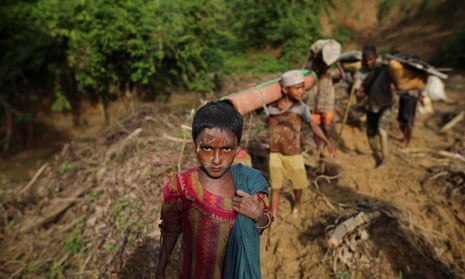Rohingya insurgents declared a month-long unilateral ceasefire last night, saying it would allow aid to reach north-western Myanmar.
The Arakan Rohingya Salvation Army (Arsa) had launched attacks on police posts and an army base last month, prompting retaliation by Myanmar’s military. The violence led to more than 270,000 refugees from the persecuted Rohingya Muslim community fleeing to Bangladesh over the last two weeks, according to the UN’s refugee agency (UNHCR).
“Arsa strongly encourages all concerned humanitarian actors to resume their humanitarian assistance to all victims of the humanitarian crisis, irrespective of ethnic or religious background during the ceasefire period,” the organisation said in a statement.
In some areas, Arsa militants seemed to have been operating without opposition. Dhaka Tribune journalist Adil Sakhawat told the Observer he had seen black-clothed Arsa militants in control of a Myanmar border outpost at Kutkhali on the Naf river, on the frontier with Bangladesh.
The free hand given to Arsa has led to fears that the government is encouraging refugees to flee across the border into Bangladesh, by providing safe passage through rebel-held crossing points.
According to Sakhawat, who had just returned from the Myanmar side of the border, the militants were armed only with wooden clubs as they watched a steady stream of refugees pass. From Kutkhali, it had been possible to see another border post controlled by Myanmar forces. “They are just watching,” he said.
That the Myanmar military had been allowing Arsa to operate freely in Kutkhali leads to the suspicion that they have opened at least one, if not two, corridors for the refugees to flee down safely, in an attempt to rid north Rakhine state of as many Rohingya as possible. With the Rohingya terrified of Myanmar forces, Arsa’s presence might be aimed at reassuring the refugees that Kutkhali is a safe way out of the country.
Observers suggest the rebels are too weak to seriously challenge the Myanmar armed forces. “Many members of the group have fled and, despite the casualties, they aren’t a very well-armed force,” said Matthew Smith of Fortify Rights, an NGO that has been documenting human rights abuses in Rakhine. “Rohingya know that this group has no capacity to defeat or even fight the Myanmar security forces.”
Yangon, which appears to be waging a campaign against Rohingya villages that many claim bears the hallmarks of ethnic cleansing, is intent on portraying its military campaign in north Rakhine as a response to attacks against nine border posts on 25 August.
Speaking to the BBC on Saturday, Myanmar’s minister for social welfare, relief and resettlement, Win Myat Aye, said: “Only those who prove they have lived in Rakhine and are citizens would be accepted to come back.”
To the fleeing Rohingya, Arsa is little more than a phantom force or they do not want to talk about it. “I don’t know about Arsa,” said farmer Abdul Kalam, 33, from a village called Sita Porakka in Maungdaw, as he lay in a dirty hospital in Cox’s Bazar, Bangladesh, 25 miles from the border.
“I don’t know why the military attacked our village,” said Kalam, also from Sita Porakka. Around him, Bangladeshi military intelligence officers milled. Fleeing Rohingya speak of the Myanmar military murdering civilians with impunity, aided by local ethnic-Rakhine militiamen.
In the past few days, the first Rohingya from Rathedaung, 25 miles (40km) from the Naf river, have begun to cross into Bangladesh. Their stories suggest that in central Rakhine the military is waging an even more systematic and brutal campaign against civilians. In a mud hut in Kutupalong refugee camp, new arrivals from Rathedaung have found shelter with relatives. “In every family, there are two to four people who have been killed by the Burmese military,” says Neyamullah, 21.
According to the UNHCR, the refugees now face increasingly dire conditions as they attempt to rebuild their lives. Thousands of Rohingya are spilling down the road that links Ukhia and Gumdum, waiting for local Bangladeshis to give them food or building materials. Local truckers, who have plied a brisk trade ferrying Rohingya to the refugee camps, occasionally lob a sack of puffed rice onto the road as a gesture of support.
“We need food urgently,” said Jaheed Hussain, 45, crouched in a shelter that he has been building. Beside him, a plastic bag with Burmese characters was stuck in the mud. “I have nothing left,” he said. Jaheed’s shelter hugs the side of the highest hill in Teing Kali. From the top he can see the smoke still billowing from the village in Myanmar that he fled from on 25 August.
“The Rohingya need food, medical support and shelter,” said Nur Khan Liton, a Bangladeshi human rights activist. “The international community is ignoring people’s basic needs.”
Many of those crossing into Bangladesh arrive destitute. “They want 10,000 Bangladeshi taka ($122) to take us,” said one new arrival, bemoaning the price that Bangladeshi fisherman are asking to take them across the river.

Comments (…)
Sign in or create your Guardian account to join the discussion